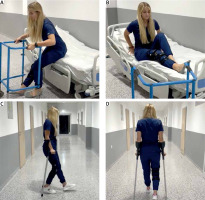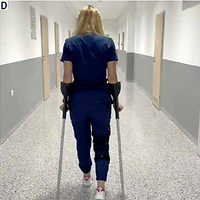Introduction
Total hip arthroplasty (THA) is one of the most frequent elective surgical procedures worldwide. The number of primary THAs in Poland in 2020 was 42,089, placing the procedure among the ten top inpatient operations. The capacity of THA is expected to increase significantly, despite a temporary decline due to the COVID-19 pandemic noted both in primary (30%) and revision procedures (40%). Restoring the former volume will burden the whole healthcare system and require extraordinary measures [1].
To address the problem of restricted access to healthcare resources, self-management strategies for patients could be implemented. Stress related to upcoming hip surgery is reduced by traditional one-on-one communication with the doctor.
The process can be supplemented by preoperative education plans such as dedicated classes, videos, booklets [2], or via Mobile Health (mHealth) solutions such as telemedicine [3] and mobile applications [4].
Nowadays, the use of mHealth is increasing with access to modern technology. The mobile applications can promote and help maintain a healthy lifestyle or be tailored to individual patient groups and interventions [5].
Material and methods
Virtual communication, including websites, social networks, and mobile applications, is part of the everyday life of all ages and socioeconomic groups. Among older adults (< 60 years) in Poland, 77.7% use the internet, mainly for email communication or to find sources for health-related content [6]. Currently, at least 74.8% of the population use smartphones on a daily basis, mostly Android and iOS-based systems [7].
Smartphone applications for patients undergoing THA can encourage healthy behaviors, provide patients with information prior to surgery, and aid during recovery and rehabilitation [4].
They could also be used in fast-track or ERAS protocols (Enhanced Recovery After Surgery), increasing cost-effectiveness and patient safety during the COVID-19 pandemic. Additional support is worth considering when outpatient appointments are limited, and patients should be discharged as early as possible [8].
There are at least seven free-of-charge applications for patients undergoing THA in English. However, direct translation into a foreign language and usage in different health systems or cultural settings raise concerns of whether patients will benefit.
The authors of the systematic review of applications dedicated to THA patients highlight the need for collaboration between patients and clinicians at all steps while creating the content. It should reflect real-life concerns and questions related to the procedure. Also, the usability should be adjusted for older patients to ensure that they can use the application effectively [4].
Most patients undergoing surgery are eager to use mHealth applications to promote independence, reach out for information, track the recovery process or interact with surgeons [9].
However, older adults can face technical problems or can have impaired vision. Consequently, the appropriate font size, good contrast, and large button sizes should be used in the entire application. The construct should be as simple as possible with easy navigation and short sentences [10].
Endopedia – mobile application for patients
Our project aimed to create the first Polish mobile application for THA patients (Fig. 1). The application designed with patient engagement could reduce surgery-related anxiety and help the patient fully understand the process in a setting with potentially limited access to reliable information.
Fig. 1
The logo project of Endopedia – first Polish mobile application for patients undergoing total hip replacement surgery. Written permission was obtained for publication purposes.

The application content was prepared based on an online survey of patients after THA and internet forums for patients. Two Internet forums for patients after joint replacement surgery (over 4,000 forum participants) were screened for the most frequently asked questions. Patients were asked what information would be most valuable to them before surgery, during their hospital stay, and after leaving the hospital.
The content was prepared according to patients’ needs by orthopedic surgeons with experience in reconstructive joint surgery, physiotherapists, and medical students, then transferred to sections and subsections of Endopedia (Table I).
Table I
Sections of Endopedia – the first Polish mobile application for patients undergoing total hip replacement surgery
Another important element of the work on the application was the creation of instructional videos. The Endopedia application was created based on aspects included in the MARS tool (multidimensional measure for trialing, classifying, and rating the quality of mobile health apps) [11].
We used usability recommendations for the mHealth application by Ahmad et al. [12]. The application has been adapted to meet the requirements of elderly and visually impaired people – large letters, easy navigation, intuitive construct [12].
Considering the needs of patients, we have created an Endopedia mobile application that is the first Polish-language portable source of information for patients undergoing THA. It introduces the preparation and the course of THA in an accessible way for every patient.
After the operation, it guides limitations and recommendations for further functioning and rehabilitation. It combines educational videos, information in text and simple diagrams or pictures (Fig. 2).
Fig. 2
Video content of Endopedia. Instructions on lying down on the bed (A) and getting up (B). When using orthopedic crutches, the patient should first adjust them to height. The technique of walking on crutches is explained in the video (C, D). Written consent to present the images was obtained.

It can be addressed to every orthopedic patient, emphasizing seniors and people with disabilities. The application can be downloaded for free from the Android store. The content is also available in a smartphone-specific website version, recommended for phones with other operating systems. Ward patients pre-tested the application. An advertising campaign on internet forums and hospitals in orthopedic wards is ongoing.
Today, mobile applications for patients undergoing orthopedic surgery are not only educational. They are used for post-operative pain control, leading to faster reduction of pain and decreased opiate consumption [13] or to support the rehabilitation process [14].
On the other hand, many mobile applications have been developed to support the work and education of orthopedic surgeons and trainees. Validated measurement tools or applications containing decision-making algorithms or guidelines simplify daily work and constitute a handy reference for physicians. Other applications allow for simulations of treatments in augmented or virtual reality [15].
Conclusions
Mobile solutions should not replace one-on-one conversation. However, they can be very helpful in conditions of limited information.
In the future, we plan to build an iOS-compatible version and expand the application with a module on total knee replacement. This is a unique project developed largely by the Student Scientific Association of Reconstructive and Oncology Orthopedics, Medical University of Warsaw, Poland, to meet the needs of patients with reduced access to medical care during the COVID-19 pandemic.
The application website is available at: www.endopedia.pl.




